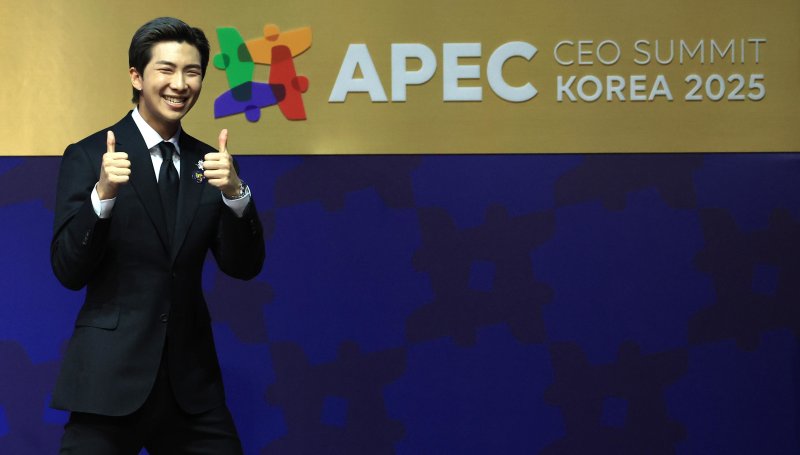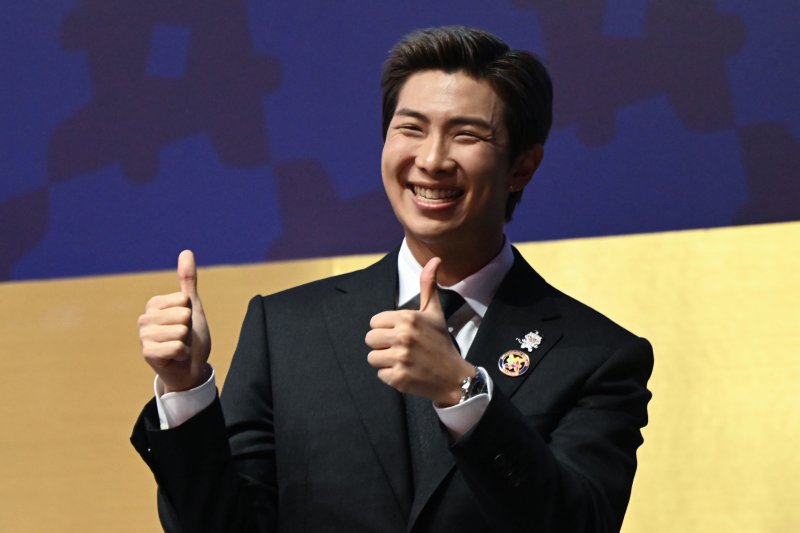BTS RM: “K-pop Is Like Bibimbap... The Power of Borderless Inclusion and Strong Solidarity” [Gyeongju APEC]
- Input
- 2025-10-29 18:37:50
- Updated
- 2025-10-29 18:37:50


[Financial News] Culture is the creative force that transcends borders, and K-pop is the symbol of that movement.
RM (Kim Nam-joon), leader of BTS, interpreted the success of Hallyu as 'embracing cultural convergence and diversity' in his keynote address at the APEC CEO Summit at the Gyeongju Arts Center on the 29th. He emphasized that the international community should work together to create an environment where creators can freely express their creativity.
He further explained, "K-pop is like Bibimbap, where different elements maintain their unique identities yet come together to create something new." He added that the 'borderless inclusivity' and 'strong solidarity' of BTS’s fandom, Adorable Representative M.C. for Youth (A.R.M.Y.), provide him with endless inspiration for creativity.
Below is the full text of the keynote speech as provided by Hybe.
Hello, everyone. I am RM, the leader of BTS.
It is an honor to introduce myself and share my message with you, the key players of APEC, here in the Republic of Korea where I was born and raised. As a creator, I feel a deep sense of pride and anticipation, especially since 'cultural industries' have been elevated to a core agenda at APEC for the first time this year.
I am not sure how familiar you are with K-Culture or the K-pop industry. However, I believe we can all agree on the immense economic value and growth potential of culture. As you know, I am an artist, not a business leader. I assume you do not expect me to recite numbers or statistics here.
So today, from a creator’s perspective, I would like to share my personal thoughts on how K-pop has moved people’s hearts across borders and the meaning of those qualitative connections. I also ask the global leaders present here for your deep interest and cooperation in building a creative cultural ecosystem for the future.
I consider myself a very fortunate person.
I met the six other BTS members and received unwavering support from our producer, "Hitman" Bang, which allowed me to focus on the music I wanted to make. Most importantly, I met our global A.R.M.Y. who embrace our music not just as entertainment, but as the language of life.
Oh, please don’t misunderstand. Although I recently completed 18 months of military service, A.R.M.Y. is the official name of BTS’s fandom.
The borderless support and passion of A.R.M.Y. have opened up completely new paths for me. Thanks to them, I have been able to speak not only at global award shows like the Billboard Music Awards (BBMAs) and the Grammy Awards, but also at the United Nations General Assembly (UNGA), The White House, and today, on this APEC stage.
A decade ago, when BTS first ventured abroad, I could not have imagined standing here in such an honorable moment.
Have you ever heard a song in a language other than your own or English on TV or radio at home? I have personally experienced how difficult it is to hear Korean songs in English-speaking countries, and how high the cultural barriers can be.
At that time, BTS’s music was naturally categorized as 'non-English culture,' and entering mainstream broadcast platforms felt like a test of whether Korean-language music could succeed globally. The barriers to getting our music on air were high and formidable.
But we could not just wait around. To create our own opportunities, we danced and sang on the streets and handed out flyers for free performances ourselves. Yet, there were even greater challenges. When introduced as 'Korean artists,' we were often asked unrelated questions: 'Are you from North Korea or South Korea?' or 'Where is Korea?' These were the most common questions we faced. It was a sobering reality where we had to explain the location of Korea before even talking about our music.
But today, I am here, having overcome those barriers, meeting all of you.
The driving force that broke down these massive barriers was A.R.M.Y. They use our music as a medium to communicate beyond borders and languages. Inspired by the messages in BTS’s music, they have sometimes initiated voluntary donations and social campaigns, surprising the world. Once seen as supporters of a minority Asian culture, A.R.M.Y. has become a new community and fandom, making a fresh impact on the global cultural market.
Even now, they are exerting positive influence across borders through the pure power of cultural solidarity. This 'borderless inclusivity' and 'strong solidarity' of A.R.M.Y. continually inspire my creativity.
Among countless global cultural contents, why does K-pop in particular create such a powerful and inclusive community? I believe the reason people from diverse backgrounds can unite through K-pop lies in its unique principle of fusion.
I compare K-pop music to Bibimbap.
Bibimbap is a traditional Korean dish. It is called 'Bibimbap' because various vegetables, meat, and seasonings are placed on top of steamed rice and then mixed together before eating.
K-pop is the same. It embraces elements of Western music such as hip-hop, R&B, and EDM, while also blending in Korean aesthetics, emotions, and production systems. Like Bibimbap, different elements maintain their unique identities yet come together to create something new.
K-pop is not just a music genre. It is a 360-degree total package encompassing music, dance, performance, visual style, music videos, storytelling content, and social media.
The success of K-pop does not stem from the superiority of a particular culture. It is because it preserves Korean identity while respecting diversity and embracing cultures from around the world. When cultural boundaries are broken down and diverse voices blend harmoniously, creative energy explodes. This is the fundamental charm that gave birth to the borderless solidarity of A.R.M.Y. and the reason K-pop is loved worldwide.
I believe that culture should flow freely, be shared, and sometimes merge harmoniously to create new value, just like K-pop. I hope this creative flow of culture continues all over the world.
The Asia-Pacific region, in particular, is home to the most dynamic cultural diversity. As the remarkable growth of K-pop proves, cultural diversity and creativity are the greatest human potentials, unconstrained by borders or limits.
Distinguished APEC leaders,
What is your favorite music?
What artwork took your breath away, or what film changed your life?
Yes, that’s right. We all love culture and the arts, and we are connected by the emotions and resonance they bring.
As a creator and artist of this era, I would like to take this opportunity to make a request to the APEC leaders.
Please provide economic support and opportunities for creators around the world to fully blossom their creativity. Investment in future generations must be addressed not only from an economic perspective but also from a cultural one. Culture and the arts are powerful drivers that move hearts and are the quickest and easiest mediums to convey diversity and inclusion.
Your policies and support as APEC leaders will become the canvas and playground of inspiration for creators worldwide. When creators are free to express their creativity, they will generate new value beyond borders. Their content will transcend all forms of 'difference,' opening the path to genuine understanding and inclusion, and fostering the power of solidarity for a better future.
I support APEC’s vision to drive inclusion and growth through culture and creativity.
As an artist, I promise to contribute by fully engaging in the broader opportunities you provide and by delivering courage, hope, and the value of inclusion through music.
Once again, I ask the APEC leaders to become strong supporters so that creators can fully express their creativity and deliver profound resonance to the world.
Thank you for listening. Thank you.
jashin@fnnews.com Shin Jin-ah Reporter